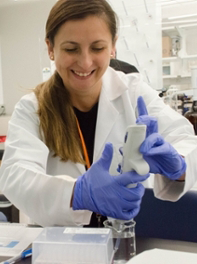Engil Pereira

Mentor since: 2020
Mentees: Diobenhi Castellanos, Isaiah Jaramillo
Field of expertise: she is a soil scientist, health by looking into soil nutrients and how we can make agricultural system more efficient byreducing pollution.
Short biography:
Dr. Engil Pereira is a soil ecologist and Associate Professor at the School of Earth, Environment, and Marine Sciences at The University of Texas Rio Grande Valley (UTRGV). Her research primarily focuses on two crucial aspects: soil carbon sequestration and greenhouse gas emissions. In the realm of soil carbon sequestration, Dr. Pereira investigates habitats where carbon is stored and the role of microorganisms in stabilizing soil organic carbon. She also examines agricultural management practices that contribute to soil organic carbon stabilization. For greenhouse gas emissions Dr. Pereira is particularly interested in identifying agricultural management techniques that can enhance nitrous oxide reduction while minimizing its production, thus mitigating greenhouse gas emissions. Furthermore, her research connects microbial communities to the variability in emissions over time and space. She aims to reduce variability in emissions assessments and seeks to understand the diversity of microorganisms involved in N2O production and consumption. This knowledge informs her work in developing new approaches to mitigation using beneficial microorganisms. Dr. Pereira's ongoing research has the potential to provide valuable insights for climate mitigation and sustainable agriculture in the subtropical semiarid region, positioning UTRGV as a center for environmental research and innovation.
Brief of summary of research projects:
She worked with Diobenhi on her research about Measuring Microbial Activity of Sweet Potato Crop in the Lower Rio Grande Valley. Her tasks included measuring the nutrients in the soil where the potatoes grew, and the goal with this project were to determine employable sustainable soil fertilization methods and how capable they are for growing sweet potato varieties (both thin and thick skinned), as well as identifying the best fertilization type to support nutrient availability for the sweet potatoes’ plants and support soil health. Cover crops in the winter, more in the field, crop them, all the farming activities. Collect the samples in the field, collect the lab analysis.
Website: https://www.soilecologylab.com/